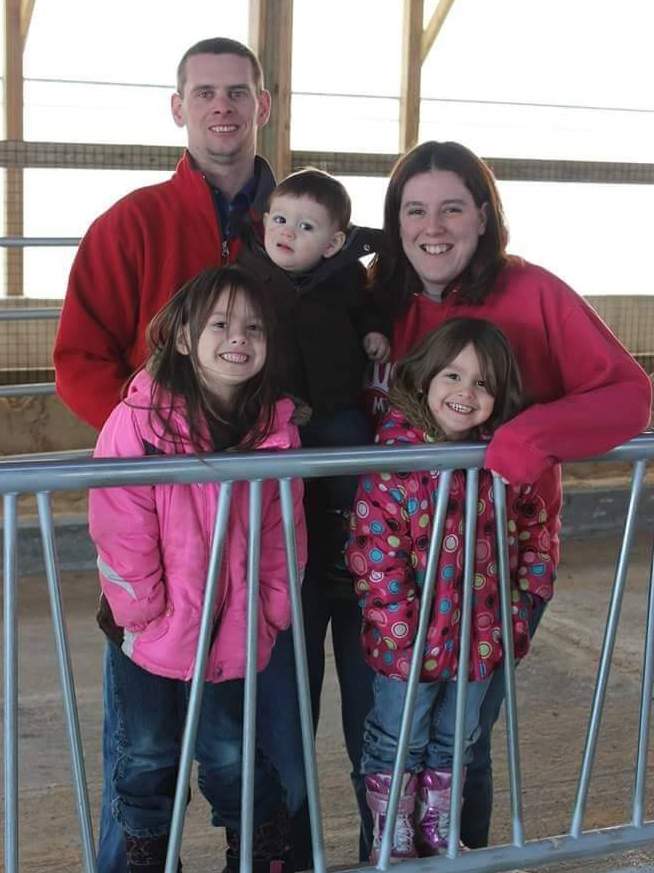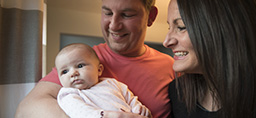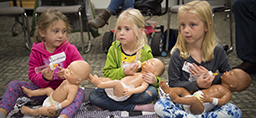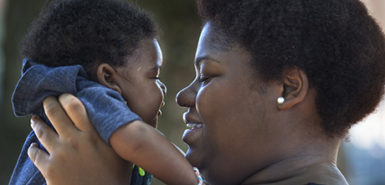
No serene lullabies floated through Jennifer Geers’ head while pregnant with her second child.
Fear shrouded her soul. Clanging, dissonant fear echoed like a harbinger of darkness.
Fear that harm would come to her yet unborn child or her toddler daughter, Natalie. And fear that she might be the one causing the harm.
“I started having intrusive thoughts about bad things happening to Natalie,” Geers said. “When I went swimming with her, I was afraid she was going to drown.”
After Hailey’s birth, Geers fell in love with her. But those bad thoughts. They wouldn’t subside.
“They scared me,” the Wayland woman said. “I kept telling my husband something was not right. I would get very angry and took it out on him. I wasn’t myself.”
Geers made an appointment with her obstetrician, who diagnosed her with postpartum depression and prescribed Lexapro.
An hour after taking her first dose, Geers suffered a panic attack.
“I didn’t want to get out of bed,” she said. “I was afraid I would go into my daughters’ room and hurt them. There were so many emotions in my head.”
Geers called an on-call doctor, who helped her.
But it wasn’t a fairy tale ending.
“I didn’t want to talk because if I did I was going to cry,” said the 2005 Plainwell High School graduate. “My anxiety level was very high. After that I got really depressed. This just was not me. I would lie on the couch. I didn’t want to hold Hailey. Every chance I got I would pass her to my mom or my husband.”
The intrusive thoughts grew so strong that Geers feared giving Hailey a bath. Rubber duck moments turned to fear of bodily harm.
“Not so much me doing it, but that she could drown,” she said. “What if it was me she drowned with? When I walked up the stairs I was afraid I would drop her down the stairs.”
One afternoon, Geers had a pair of pliers on the bathroom counter. Hailey was on the floor. The tool fell and almost hit the child.
“That triggered me,” Geers said. “I started crying and screaming. I said, ‘I can’t do this anymore. You have to take me in.’”
Her husband, Daniel, took her to a local emergency room.
“I felt like there was no hope,” she said. “It was very, very scary. It was hard to stop the intrusive thoughts. They would always roll.”
Geers attended an outpatient clinic at Pine Rest and began taking Zoloft, which seemed to help.
She later discovered the postpartum depression group at Spectrum Health, which she says helped upright her upside down world.
“I met the most amazing women there,” she said. “The support of the postpartum depression group is what really helped me out. I thought I was the only one in this whole world that had the intrusive thoughts.”
Daniel attended the first session with her.
“I started telling the group about my thoughts,” she recalled. “Almost everyone in the group said, ‘Yup, I’ve had them.’ That helped me out so much.”

Geers has since had her third child, Jay, now 20 months. She has no issues.
She continues to attend postpartum depression support group meetings, three years after she first sat down at one.
“Mostly what I go for now is for the other women,” Geers said. “I was so lost and just felt so hopeless. I want other women to know there’s a light at the end of the tunnel and you can make it through it. For me, I left everything up to my heavenly father. He was the No. 1 thing that pulled me through.”
Geers learned that hormones are the main culprit of postpartum issues.
“You have so many hormones that are changing,” she said. “In the group, they teach you what your hormones do when you get pregnant, have a baby, start nursing and stop nursing. These are all challenges for a postpartum woman.”
Nancy Roberts, RN, an educator with Spectrum Health Healthier Communities post partum emotional support group, said the gatherings, facilitated by a postpartum depression nurse and therapist, provide a wonderful outlet for patients.
“It’s a safe place to share their feelings and garner support from others in similar situations,” Roberts shared. “It’s non-judgmental support and a place to share postpartum depression resources for additional support.”
Unfortunately, there can be a stigma attached to condition, she noted. But thankfully, that is changing. The American Congress for Obstetricians and Gynecologists now recommends screening for postpartum depression at least once during pregnancy and postpartum.
“Discussing current feelings with other new moms takes the stigma away from having depression or anxiety and normalizes many of the emotions they may be having,” Roberts said. “Also, meeting others who have recovered gives them hope that they will recover.”
Geers advises women to be on the alert for mood changes.
“Postpartum depression and anxiety can happen to anyone,” she said. “It doesn’t matter if you’re black, white, hispanic, a teacher or a stay-at-home mom. When I started going to the group there were women there that helped me see there is hope and you can get through it.”

 /a>
/a>
 /a>
/a>
 /a>
/a>
Thks was very very good. It showed that any one who suffers from this or even depression can get help for this. It is great that there is such a great support group for this we need to put God first in all of this and receive help Thank you for this article.Mrs. Here is my cousins daughter .She is a very fine lady.
I have a developmentally disabled son, age 42. His mind is like 2 yrs. old, but he is nice looking and healthy. When my husband and I went to Ken O Sha in Grand Rapids in the late 1970’s, we were told I was nervous, so that probably caused this. I have lived with this for 43 years, and I don’t really think nerves can cause this ?
Karen,
Please don’t continue to beat yourself up about this. That’s alot to live with for 43 years! Many women are nervous when they are pregnant. Why developmental delays happen we don’t know, but there was something that went on in his brain. Continue to be that great mother you are and let go of that guilt!